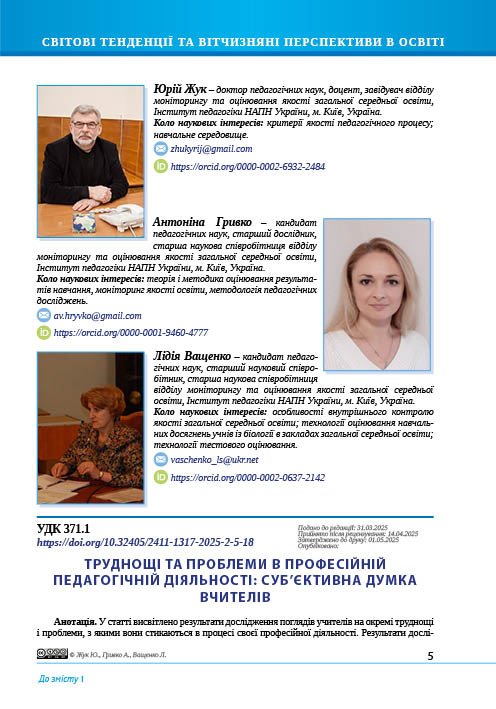Abstract
The article highlights the results of a study on teachers' views on specific difficulties and problems they encounter in their professional activities. The study results allowed for ranking the difficulties and problems defined in the research by their commonality for the surveys’ participants and examining the differences in teachers' views on difficulties and problems in their professional activities according to varying lengths of work experience. Factor analysis of the survey results identified six clusters where specific professional difficulties and problems are concentrated (work environment, didactic activities, additional duties, social environment, psychological resilience, and accountability) and determined the most significant components of professional activity regarding the emergence of difficulties. Content analysis of open responses identified clusters of problems relevant to the survey participants and determined their significance for the participants at the time of the study. Conclusions, provided based on study results, can be used in recommendations for supporting teachers at macro, meso, and micro levels of the education process. The research was conducted within the framework of the scientific research "Evaluation of the Professional Activities of Secondary School Teachers". The authors proceeded from the idea that the primary purpose of teacher evaluation is to help teachers overcome difficulties and problems that may complicate the performance of their direct professional duties – teaching and educating students.
References
Albudaiwi, D. (2017). Survey: open-ended questions. In The sage encyclopedia of communication research methods (Vol. 4, pp. 1716-1717). SAGE Publications, Inc. https://doi.org/10.4135/9781483381411
Bartholomew, K. J., Ntoumanis, N., Cuevas, R., & Lonsdale, C. (2014). Job pressure and ill-health in physical education teachers: The mediating role of psychological need thwarting. Teaching and Teacher Education, 37, 101–107.
Bumagat, R. J. M., Ordillas, M. G., Rogayan, D. V., Basila, R. M. G., Gannar, M. I. R., & Catig, M. J. (2023). Practices and Challenges of Teachers in Teaching Science Online. International Journal of Technology in Education and Science (IJTES), 7(3), 306-330. https://doi.org/10.46328/ijtes.484.
Edu, D. O., & Edu, G. O. (2013). Attitude and experience as influencing variables of teachers' perception of difficult concepts in primary science in Icon Educational Zone, Cross River State, Nigeria: the need for curriculum review. International Education Research, 1(1), 60-68. https://doi.org/10.12735/ier.v1i1p60.
Hakanen, J. J., Bakker, A. B., & Schaufeli, W. B. (2006). Burnout and work engagement among teachers. Journal of School Psychology, 43(6), 495–513.
Harmsen, R., Helms‐Lorenz, M., Maulana, R., & Van Veen, K. (2017). The longitudinal effects of induction on beginning teachers’ stress. British Journal of Educational Psychology, 89(2), 259–287.
Holtgraves, T. (2004). Social desirability and self-reports: testing models of socially desirable responding. Personality and Social Psychology Bulletin, 30(2), 161–172. https://doi.org/10.1177/0146167203259930
Klassen, R. M., & Chiu, M. M. (2010). Effects on teachers' self-efficacy and job satisfaction: Teacher gender, years of experience, and job stress. Journal of Educational Psychology, 102(3), 741–756.
Philipp, A., & Schüpbach, H. (2010). Longitudinal effects of emotional labour on emotional exhaustion and dedication of teachers. Journal of Occupational Health Psychology, 15(4), 494–504.
Plavšić, M., & Diković, M. (2022). What is Most Difficult in a Teacher’s Job from the Perspective of Teachers, Students and Parents? Journal of Elementary Education, 15(1), 31-50. https://doi.org/10.18690/rei.15.1.31-50.2022.
Prilleltensky, I., Neff, M., & Bessell, A. (2016). Teacher stress: what it is, why it's important, how it can be alleviated. Theory Into Practice, 55(2), 104–111.
Salgado, J. (2005). Personality and social desirability in organizational settings: practical implications for work and organizational psychology. Papeles del Psicólogo, 26, 115-128.
Skaalvik, E. M., & Skaalvik, S. (2011). Teacher job satisfaction and motivation to leave the teaching profession: Relations with school context, feeling of belonging, and emotional exhaustion. Teaching and Teacher Education, 27(6), 1029–1038.
Tomo, A. (2019). Professional identity crisis: Balancing the internal and external perception of professional image. Emerald Publishing. https://doi.org/10.1108/9781787698055

This work is licensed under a Creative Commons Attribution-NonCommercial-ShareAlike 4.0 International License.


